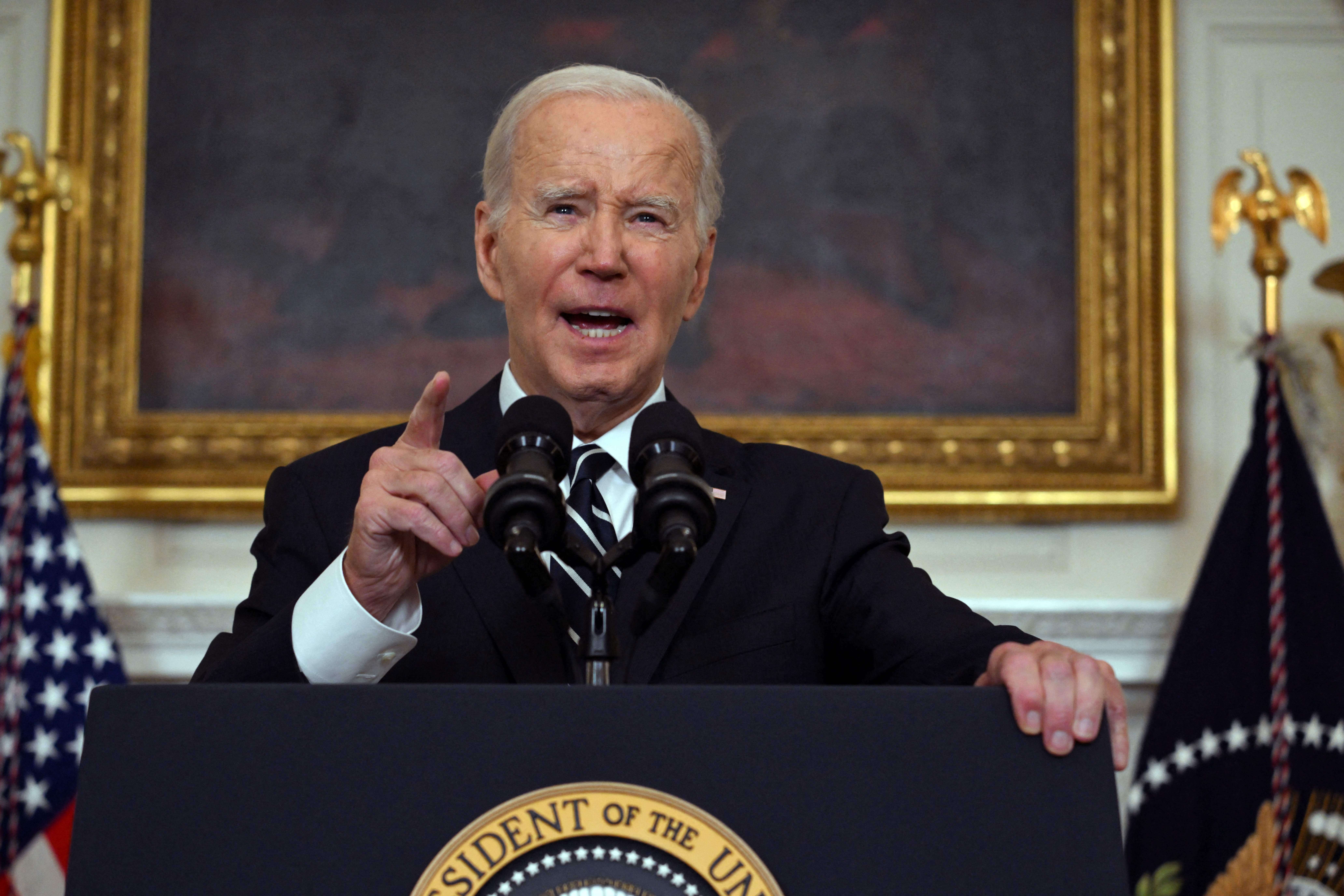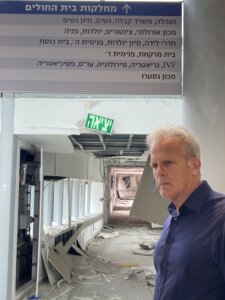Michael Oren breaks down Biden’s ‘remarkable,’ ‘extraordinary,’ ‘historic’ speech on Israel
‘He’s of that generation that still has, as we say, Israel in his heart’

Joe Biden addresses the terrorist attacks in Israel from the State Dining Room of the White House on Oct. 7, 2023. Photo by Getty Images
Michael Oren, the loquacious, prolific, polymath former Israeli ambassador to the U.S., reached out Wednesday morning in his typical urgent way. He had something to say — a lot to say, actually — about why President Joe Biden’s speech the day before about Israel’s war with Hamas was extraordinary. But he didn’t have time to write an op-ed, as he occasionally does for the Forward; he needed to just talk.

Oren, 67, who made aliyah from New Jersey in 1979, is a prizewinning military historian of the Middle East who served in Israel’s Knesset from 2015 to 2019. During his tenure in Washington, from 2009 to 2013, Biden was his main point of contact — they had scores if not hundreds of conversations and meetings, including a number of 1:1s.
He called me Wednesday from his car, as he headed back to his home in Tel Aviv from Ashkelon, where he’d attended a shiva for a 19-year-old member of the Israeli border police who, he said, “killed three terrorists before they killed her.” Traffic was stopped, as police on motorcycles checked every car headed south, and helicopters buzzed overhead.
Earlier that morning, Oren said, his daughter had called. The rabbi who performed her wedding ceremony had two sons, officers in the reserves who headed south Saturday as the attack unfolded. Both were killed. “I just burst out crying,” he said. “You’re so raw, you’re just hearing these things constantly.”
But he was buoyed by his friend Biden, whose speech Tuesday was filled with what Oren said were remarkable, historically significant statements that heralded a new era in the U.S.-Israel alliance. “I’m sitting there in front of the TV going ‘My God, my God, my God, my God,” Oren recounted. “I’m telling you I had tears in my eyes.”
Here is Oren’s analysis, from his deeply Zionist and generally conservative worldview, excerpted from our 20-minute conversation:
‘The unbridled passion of it’
I’ve been involved in U.S. relations as a historian and practitioner for many decades, and I’ve never heard anything remotely like this. The deep passion — I would say the unbridled passion of it — where he connected the pain of Israel to his personal pain. This is a man who’s lost a wife and two children.
It was unusual in giving unequivocal support to Israel, Israel’s right to defend itself, unqualified condemnation of terror. And describing the atrocities in detail.
I don’t recall a presidential address about Israel — or indeed, just about any other country — in which the vice president and the secretary of state were standing behind the president. It was pretty amazing. They were standing there, just standing at attention.
It was extraordinary in giving Israel a green light. If you can hear a green light, the speech described a green light — to pursue a ground operation in Gaza, to rid Gaza of Hamas.
All that was astonishing. But then he surprised me further, by what the administration was willing to do strategically and logistically for Israel.
‘We didn’t even have to ask for the keys’
Oren explained that since the administration of President George W. Bush, some $2 billion of U.S. military material has been stored in underground warehouses in Israel. The munitions are ostensibly for emergency support of U.S. military forces in the Middle East, but during past conflicts, Israel has borrowed from them to restock itself.
The IDF expends, in any given battle day, about a million bullets. In every war, we run out of different kinds of ammo, and we have to request the keys from the United States to open the warehouses, and then we take what we need, we write it down and we pay for it.
What was astonishing about the speech was, the president preempted our request for the keys, and said “I’m going to give you the munitions right now.” The planes are landing already.
We didn’t even have to ask for the keys.
And then he gave a warning, to Iran and Hezbollah, that was unmistakable. He said, “Don’t you dare.” He said America is willing to use force. He did say, we’re not going to put boots on the ground. But that did not preclude the use of the immense array of weaponry that is brandished by these flotillas they are mobilizing for us. The USS Ford, the aircraft carrier, has 75 attack planes on it. That’s huge.
Keep in mind: Probably the only issue that secures bipartisan support in Washington is opposition to foreign entanglements, to military entanglements, particularly in the Middle East.
Now here comes the president, for the sake of Israel, he’s willing to take that on.
He also said he was willing to work with a dysfunctional Congress to get us emergency financial aid if we need it.
‘He loves the state of Israel’
Then there was somewhat of a caveat, which was subtle, but some people picked it up here as well. He said the IDF, like the American Army, operates under law, in contrast to the terrorists, which don’t operate under law.
I read between the lines the following: I’m giving you a green light to go into Gaza, but you have to as much as possible limit collateral damage, civilian casualties. He was saying: I’m going out on a limb here with my own party, help me to help you.
I asked about how this fit into the Biden he had worked with so closely in Washington. Oren laughed and mentioned that Tom Nides, who was Biden’s ambassador to Israel until July, once said that the president “thinks of himself as half-Jewish.”
He would talk very tough with me, incredibly candidly, but always from the heart. He loves the state of Israel. He’s of that generation that still has, as we say, Israel in his heart. He remembers 1967. He remembers 1973. Biden remembers the Holocaust.
You feel it, you feel it. He’s an Irishman, you know, and he has that Irish compassion, and it came across. Every minute with him I enjoyed, though they were tough minutes.

















